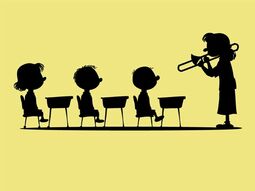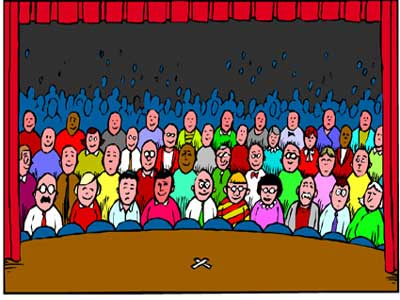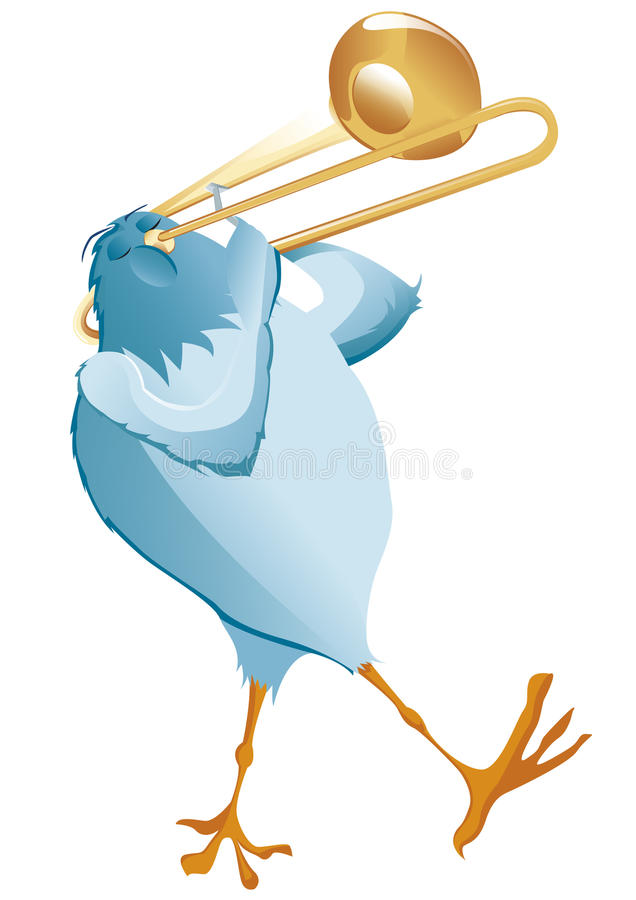My thoughts
 When all your players can not make a gig, is it cool to make a smaller group from your big band? Can you still use the same name of the group? If not, what do you call it? I always like the name "little big band" as there is humour and conflict in the name and I gravitate towards that. But, back to the issue at hand; is this ethically the right thing to do? I mean, where does it stop. Do you keep making permutations of the group to fit the gig, e.g., quartets, trios, duets etc. It then becomes a music agency rather than a big band or music group. In my opinion, I think it is okay to take a slightly reduced group into a smaller venue when it is appropriate or to offer/form such a group when there are no other options: players are limited or the space is limited. A little big band to me has several horn players, often multiple reed players, and representatives for each section: saxophones, trumpets and trombones. Additionally, it has a full rhythm section and may or may not have both the guitar and piano. Anyway, this is the predicament I have found myself in and I will embrace. Finding and writing new charts for this reduced instrumentation. Wish me luck.
1 Comment
Musicians teaching their kids. To push down that road or not? #career #music #lifebalance #happiness1/24/2019  I often wonder if I am giving enough of myself to my kids. Sure, I am a loving and caring Dad, but as a musician do I have an obligation to pass on my craft? We started our kids in piano lessons and have had varying degrees of success, but I have not really dug down and really tried to motivate my kids in music. Is it enough to lead by example, practicing, gigging and such? I am a trombonist by trade and shoot, my son is in fourth grade and I have not really pushed him towards any sort of wind instrument. Maybe that is a blessing, as music shouldn't be something that you have to do, but something you want to do. I am torn, as I am proud that I have not pushed my kids in the direction I want them to go, but maybe a little encouragement in the areas that I am skilled would be helpful. Well, that is parenting for you. Learn as you go. Well, to end this blurb, I will say that I will start giving my son and daughters more opportunities to try different instruments and see where their interest takes them.  It has been a while since I blogged. I could not stay silent on this one. I am noticing at my children's elementary school that at the Christmas concert, everyone is singing along to a prerecorded track - lipsyncing. To their credit, the teachers did lower the volume on the track so that you could actually hear the children singing this year, a nice touch. However, are we so far gone that we will not risk our children singing Christmas songs to their parents? What does this teach the children? The message to me is that this is live performance, where the actions on stage trump any musicality. And, the choreographed moves on stage or simple, goofy and hastily put together - but the audience eats it up. Why not? We have all been programmed that the visual aspect of the show is paramount. Everyone loves to see their Johnnys or Sallys struggling to march in-step to the beat while they do their best Brittany Spears impression. And, worst, the children think this is music: singing along to someone else belting out the exact same part - and I am not talking about beautiful, balanced, in-tone monophony that you would find in a choir. Well enough of that rant. If you have read this far, you either agree or are just puzzled. Had some great advice between sets last night. For those of us you have performance anxiety on the band stand (and there are a lot of us), it is good to keep in mind that it is not any single number or night that defines us as musicians, but our reputation over time. I have spoken before about how the audience can be forgiving. Likewise, your fellow musicians can be understanding, if you have a good track record. If you miss a note or under perform, here and there, is not as big a deal as how you perform generally, and people will remember your overall competence. So take that breath and let your true ability shine through.
Found out recently that mouthpieces really do affect intonation. If you browse the internet, you will get some general information that shallow mouthpieces make you sharper and deeper mouthpieces make you flatter. This is logical to me, as a shallow mouthpiece means that there is less room for the air to travel to get to the horn, i.e., the horn is essentially shorter and therefore, of a higher pitch. However, I think there is more to it than that. As I play around with various mouthpieces and the overtone series on the trombone, some mouthpieces are just a better match for me, intonation wise. This is not something that you think to try at the store when you are testing out the mouthpiece (at least I did not think to do it), i.e., use a tuner with the new mouthpiece (& horn) and see if you are playing any differently with the new equipment. I would recommend doing this, as I found that the mouthpiece that felt and sounded pleasing messed with my intonation. It is a lot of work to get your intonation back in line, so it is something to consider before making a major change in your equipment.
 Even if you make some mistakes in a performance or even if you happen to fall apart at a point, keep things in perspective. The audience is generally on your side. They want to be entertained and are not there to chastise you when things go astray. Brush it off and keep delivering that high energy show and good quality music. The audience will remember the overall effect. An "Ella Meets Mel" concert tonight at the Harbour Banquet Centre. Starts at 7:30 PM. I haven't done this series before, so I am pretty excited. You can get more information at www.octokats.com
If you are getting frustrated with a task you are practicing, leave it and come back. In the interim, your brain will be digesting and organising the information you have given it. When you come back, you may be surprised at your improvement. Not only are you refreshed, but your brain has been working subconsciously on the information while you were doing another task. That task can be another related task or something completely different. So, it is actually better to "interleave" your learning and not take any exercise to full completion. Move back and forth between activities and harness the power of interleaving. And no, this is not multi-tasking. Stay away from that. It has been proven to minimise your effectiveness is all activities.
When does a fine selection of mouthpieces become a problem . . . maybe mouthpiecepurchaseanosis. Next thing you know, you have mouthpieces holding newly cut flowers, displayed throughout the house. I'm not sure. I think the quest for the perfect mouthpiece can be all-consuming and at some point, you must say, "This is pretty good, let's get to work." I only bring up this topic because I was kidding with my trumpet section last night, saying that I was now a mouthpiece guy and Todd, our soloist, asked how many mouthpieces I had. I answered six. He replied, "You are just getting started." All good things in moderation.
|
Dr. Michael KearnsMusician, educator, husband, father, web designer ... my life is like a mosaic with each piece vying for my attention. Archives
March 2019
Categories
All
|

 RSS Feed
RSS Feed